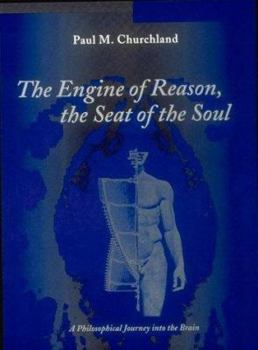The Engine of Reason, the Seat of the Soul: A Philosophical Journey Into the Brain
Select Format
Select Condition 
Book Overview
A picture of the mind is emerging, and explanations now exist for what has so long seemed mysterious. Philosopher Paul Churchland explains these scientific developments in a simple, authoritative fashion. He not only opens the door into the ongoing research of the neurobiological and connectionist communities but goes further, probing the social and moral dimensions of recent experimental results that assign consciousness to all but the very simplest...
Format:Paperback
Language:English
ISBN:0262531429
ISBN13:9780262531429
Release Date:August 1996
Publisher:MIT Press (MA)
Length:342 Pages
Weight:1.55 lbs.
Dimensions:0.7" x 7.1" x 9.8"
Customer Reviews
4 ratings
Excellent expression of ultimately false views
Published by Thriftbooks.com User , 15 years ago
Paul and Patricia Churchland are the leading advocates of the ¡§it really isn¡¦t anything¡¨ branch of materialist views of consciousness. They assert that one need only investigate how the sensing, processing, and reactions are generated by our brains, and this provides a full description of consciousness. They do not use the label, but they are behaviorists. While I consider this approach very wrongheaded, Paul Churchland¡¦s detailed presentation of this idea is an insightful work of a keen intellect, and I learned a great deal from him about brain function. What he discusses are the characteristics of neural networks. Neural networks are distributed analog processing nets, where multiple layers of inputs, secondary, tertiary, and quadrenary nodes are linked, and the interaction strengths of these linkages are adjusted in order to perform a task. Such networks have been shown to be quicker and more accurate than algorithmic programs in doing things like facial recognition, linguistic grammar checking, and most of the other discrimination functions we do. They are also tolerant to incomplete input data, and fault tolerant to loss of some nodes and connections. Since this is how the brain is actually wired, he considers the strengths of these networks to be of tremendous relevance to brain studies ¡V much more relevant than the behavior of linear computers with CPUs. Basic neural nets have no time-functional behavior, but he points out that if the processed states form middle and upper tiers are fed back into the net as part of the input data, then such nets become capable of periodic state behavior, such as the pattern of activation of muscles in a walking or running leg. Such cyclic behavior can be continued without new inputs, and will be changed by new inputs ¡V much like animal/human behavior. Since neural activation regions when running DO follow a cyclic pattern, and animal/human brains HAVE a huge number of such back-looping neuron connections, he also considers this significant relative to our brain function. The alternative to materialism, spiritual dualism, he rejects out of hand with cursory dismissiveness, despite admitting that the vast majority of educated people in the world hold by it. The real target of his book is what he calls ¡§folk psychology¡¨. This is the belief that we are: { Self-conscious { Hold beliefs { Have emotions { Have the power of reason He considers all of these assumptions to be fundamentally false, and wants to replace them with descriptions of neural net characteristics as a new ¡§folk psychology¡¨. He proposes a list of what he considers consciousness to consist of, and then claims that recursive neural nets, combined with some other observed aspects of bran wiring, fully explain this list.: 1. Short term memory 2. Independent of Sensory Input 3. Steerable Attention 4. Alternative interpretations of ambiguous data 5. Disappears in deep sleep 6. Reappears in dreaming 7. Senses integrated in
a compelling case for eliminative materialism
Published by Thriftbooks.com User , 25 years ago
this is truly a fantastic book. churchland presents his ideas clearly while introducing us to fascinating new results from research with artificial neural networks, which make a strong case for his brand of materialism. while looking at a review here and reading the back-cover i noticed a mistake people are making regarding interpretation of churchland's view. churchland is *not* a reductionist, he is an eliminationist. for churchland neural states are not the same as mental states; "mental states" as-we-know-them are part of a theoretical framework known as "folk psychology" that's doomed to disappear just as beliefs in witches, caloric fluid, and demonic sources of illness disappeared from our knowledge pool.
A must for anyone interested in the area!
Published by Thriftbooks.com User , 26 years ago
Very readable introduction into current developments in the computational neurotechnology area. Examples vividly explain various specialised functions of the brain. Not as technical as Damasio's "Descarte's Error" and also from a somewhat different perspective.
Extraordinary analysis of neuroscience & human intelligence
Published by Thriftbooks.com User , 27 years ago
Developments in neuroscience over the last decade will doubtless be compared to the Copernican revolution, totally changing the way educated citizens think of human nature. Churchland provides an invaluable guide to recent research into neural networks, surveying the social, moral, legal and philosophical implications of contemporary neuroscience. While not giving as much emphasis to either the emotional dimension of cognition as Damasio (DESCARTES ERROR) or its social origins and ethical function (see my BEYOND RELATIVISM), Churchland's focus on neural networks has compensating advantages, especially for anyone interested in learning how to think about the way the brain works when we think. Must reading for philosophers and social scientists who are aware that the human brain is neither a blank slate nor a serial computer





